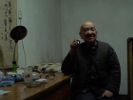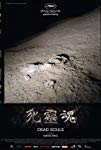Eye For Film >> Movies >> Dead Souls (2016) Film Review
Dead Souls
Reviewed by: Jennie Kermode

It is impossible to watch Wang Bing's latest documentary epic without thinking of Shoah. Indeed, practically every critic has referenced it, and not just because of this film's eight hour plus running time or the manner in which it uses that; rather, because of its quality and impact. Utterly immersive despite its length, it is being released in three parts in some places but should be watched in single go if one is to appreciate the full effect. Wang wants the viewer to be exhausted by it. It is, after all, about events that exhausted China. By the end, viewers will be emotionally broken down, struck by the enormity of the events described; in this way they might touch on the experience of those whose stories it tells.
This is the story of the purges that took place in China between 1957 and 1962. Officially they were dubbed anti-rightist, but as with all such actions, personal vendettas soon became a factor too. Perhaps still more disturbingly, so did the filling of quotas, with local officials keen to ensure that they were precise in arresting 5% of the population as advised. Around 550,000 people wee sent to labour camps, among them Jiabiangou and Mingshui in the Gobi desert. There they were forced to do backbreaking work and were fed 250 grams of rice each per day - about 280 calories. Not surprisingly, most of them died.

in interviews conducted in the early part of this century, Wang spoke with some of the survivors - mostly male, the youngest in their seventies, all with that particular gauntness which the bodies of those who have starved never quite shake off. Most speak from their homes, seated in small kitchens or cosy living rooms or, where too weak to move, lying in bed. The way the light spills into their homes, the few possessions we see, sometimes the presence of a supportive spouse or friend - these things speak to the intervening years. Most of the interviewees speak of the past in a calm, distanced way. For a few, it's as if they only just left the camps. Their anger remains raw. Sometimes there is a shadow of fear not yet unlearned.
One man speaks of how he survived because his wife smuggled him rice flour grilled in oil. Others talk of eating weeds or paper, and there are hints that cannibalism also occurred in the camps, as it usually does during famines. Most of those who made it did so by stealing food from the general supply. Some talk about the deals they managed to make; one discusses the religious visions that gave him solace. A wife remembers the experience of visiting the camp and of trying to survive after her husband's death, getting up at 4am each day for work and still somehow managing to support three children and nurse them all through measles. Her husband's own words reach us through his letters.
Many of the stories are very similar but they are all compelling. Wang moves his camera only occasionally, almost distractedly, when interviewees pause, like a guest glancing around. When they speak, their testimony is stark, always clear, etched in the memory. Several have died since the recordings took place. The film feels like a monument to them and to all those who died in the camps - not a mere sentimental tribute but a vital remembrance, ensuring that their voices are not lost. Though it seems unlikely to be warmly received by China's censors even today, it is a step towards justice.
After eight hours of listening with only occasional outdoor scenes, Wang takes us to the desert remains of one of the camps. At first sight there is nothing but dirt. The the camera moves closely.There, in the dirt, is a piece of bone. Further on, another, perhaps a femur, long ago split open, probably by a wolf hungry for the marrow. In a ditch nearby, a couple of ribs are still attached to a fragment of fused spine. These pieces of people lie scattered across a wide area of ground - no-one had the strength to bury them properly. Soon we find skulls. Wang lets the camera linger, reminding us that each was once a human being as vital as any of us.
Some people make films to entertain, some to try and change the world. Wang Bing has made this film because it's necessary.
Reviewed on: 23 Nov 2018

















